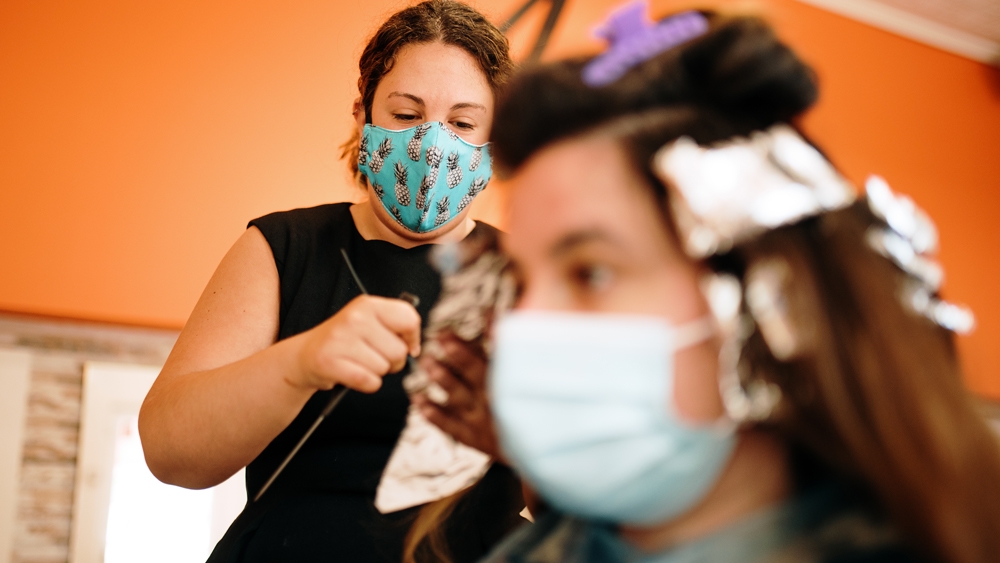Visiting a client in their home brings different insurance concerns compared with working in a salon environment. Accidents are potentially more likely to occur in a client’s home rather than a salon as hairdressers are working in an unfamiliar space.
Across the world, Hair and Beauty Professionals have been setting a new Global Trend: they have found the need to seriously modify their way of working. Reductions in social mobility, the option to work from home, the exodus of daily commuters to city centres and the need of client to shield for health reason have all seen a rise in erstwhile salon-based hairdressers and beauticians hitting the road and ‘Going Mobile’. Search engine research has found that more UK hairdressers are considering going mobile, a decision also driven by limits on the number of salon clients and lengthy clean-down procedures between appointments. Professional liability insurance should be a major consideration for anyone going mobile, albeit temporarily.
According to the small business insurance expert, PolicyBee, in June 2020, online searches for ‘mobile hairdresser insurance’ increased by 233% year on year (as compared to June 2019). Whilst searches for ‘mobile hairdresser insurance’ more than doubled between May and June 2020. As stylists prepared to reopen their businesses in early July, it seems a number were researching providing a mobile service. There’s also been an increase in searches for ‘hairdresser home visit’ and ‘hairdresser home visit near me’, which indicates that clients are choosing to book a home visit rather than enter a salon environment, perhaps due to health concerns.
Treatment and professional liability insurance protects hairdressers in the event of an injury to a client during the delivery of a treatment, for example burns to their scalp from hair dye. If such an incident occurs and the client feels the hairdresser is to blame and takes legal action, treatment and professional liability insurance would cover the hairdresser’s legal fees and any associated compensation payment – potentially saving the hairdresser hundreds, even thousands, of pounds. Similarly, public liability insurance protects mobile hairdressers in the event of an accidental injury or damage to a client’s property during a home visit, such as a trailing electrical lead causing a trip or damage caused by a heated appliance on the wrong surface. Both types of insurance should be considered by hairdressers providing mobile services.
Amy Restall, treatment and professional liability insurance expert at PolicyBee, has noticed an increase in the number of insurance enquiries received from hairdressers who are considering going mobile: “The coronavirus outbreak has meant many UK businesses adapting to stay safe for customers while remaining profitable. Hairdressers had several weeks to prepare to reopen as lockdown measures eased. As well as stocking up on PPE and creating a socially-distanced seating arrangement, hairdressers have had to think about protecting themselves legally in case anything goes wrong upon reopening.
“The increase in mobile insurance searches indicates hairdressers are being proactive in taking out policies to cover them during home visits, which is excellent news. This year has been financially challenging for businesses such as hairdressers, who rely on coming into physical contact with clients to provide their services, so it’s crucial they have the appropriate legal protection in place. This is particularly important for hairdressers who are switching from providing in-salon services to home visits, as the risks are different and usually higher.
“For example, taking out portable equipment insurance would mean a mobile hairdresser is covered in the event of any damage caused to, or theft of, their professional equipment. Rather than being out of pocket and without a vital piece of kit, insured mobile hairdressers can quickly acquire a replacement item without worrying about the cost.
“The reality is that if an injury to a client occurs and a hairdresser hasn’t taken out medical malpractice insurance, it could end their business due to spiralling legal costs – or at the very least cause a great deal of stress. Insurance is there for peace of mind, which is much needed as we slowly come out of the uncertainty of the coronavirus lockdown.”
It seems likely that mobile hairdressing services will increase in the future, as it provides stylists greater flexibility in providing their services and will be in demand from clients with health concerns. The ongoing coronavirus crisis means things can change for businesses at any moment. It’s more vital than ever, therefore, that self-employed and mobile hairdressers protect themselves and their business by ensuring they have taken out adequate insurance.











